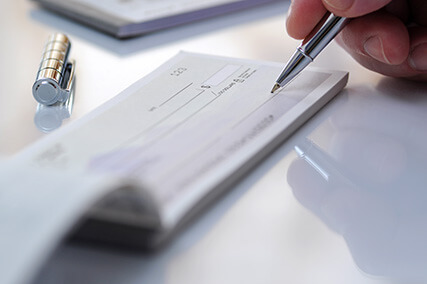While many people are taking advantage of paying their bills through Web BillPay, payment using a paper check may still be preferred in some circumstances to avoid transaction fees, for gift giving or may even be required by some businesses.
Check fraud can take several forms including:
- Check counterfeiting by illegally printing checks using information from legitimate accounts
-
Check washing in which chemicals are used to alter the appearance of a check
- Stealing checks to use for fraudulent transactions
- Forging a signature or endorsement on a check
To protect yourself from check fraud and to protect the security of your checking account, follow a few simple rules:
- Print the minimum information required on your checks. Do not include your social security number and do not add any information that is not required in the course of a normal transaction. Check fraud can escalate to identity theft.
- Keep your checkbook and extra checks in a safe location in your home, preferably a locked drawer, to reduce the risk of theft.
- Mail your checks at the post office, when possible, and avoid leaving checks in your mailbox where they can be stolen.
- Write checks with permanent ink pens so the ink is more resistant to alteration by chemicals or solvents used by fraudsters for “check washing.”
- Keep close tabs on your checking account activity and the status of the checks you’ve written so you can quickly identify and report fraudulent transactions.
NOTE: You can also be victimized by check fraud if you receive a fraudulent check to pay money you are owed. If you receive a check you were not expecting, it is important to contact the issuing financial institution to verify the check.
Take measures to protect your checks and the information on them to reduce your risk of being a victim of check fraud.

